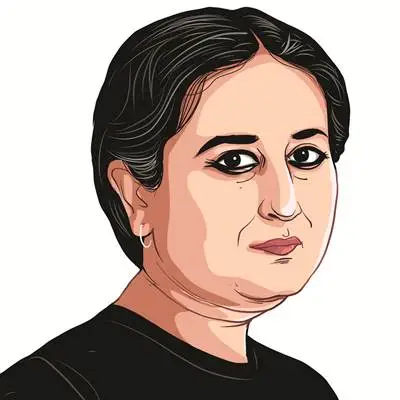Opinion Vandita Mishra writes: Ahead of the G20, the Modi government has two faces
A flinty-eyed government with a winner-takes-all approach, constantly looking to ambush its political opponent. A vishwaguru, advocating an inclusive model of global welfare and development
 Different strokes: What Modi says at home is different from what he says at a forum like G20 (PTI Photo)
Different strokes: What Modi says at home is different from what he says at a forum like G20 (PTI Photo) Dear Express Reader,
This week the Narendra Modi government rolled out one more weapon, make that two, from its shock-and-awe arsenal. All of a sudden, it announced a special session of Parliament. And the very next day, a committee under a former president of India to examine the proposal of one-nation-one-election.
The agenda for the special session of Parliament is still something only the government knows and won’t share with others. As for the new committee, names of other members were announced subsequently, eight in all, provoking the lone Opposition voice, Congress’s Adhir Ranjan Chowdhury, to withdraw immediately, calling the exercise an “eyewash” and pointing to a conclusion that seems pre-determined.
Both the secrecy that shrouds the special session and the packing of the one-nation-one-election committee with members who are known to back the government and/or the idea of simultaneous elections, touch off important concerns.
Parliament stands for dialogue and deliberation, scrutiny and accountability and participation — a guessing game or a cloak-and-dagger drama of the kind playing out around the special session runs contrary to its essential principle and practice, its fundamental promise.
The one-nation-one-election idea has been discussed before and it remains controversial. It stokes fears about a project to impose uniformity and homogeneity. As our editorial said, the proposal “points to a real problem but the solution it offers is dissonant in a parliamentary system with a federal framework — it promises, or threatens, to give it a more presidential and unitary character”.
In a large and diverse democracy, the stealth and one-sidedness of the government’s moves on consequential and controversial matters is not merely about political style. It speaks of larger, disquieting things.
Most of all, it points to something that has become this government’s calling card: A great, bottomless contempt for the Opposition.
In a democracy, at any point of time, the government’s refusal to acknowledge the Opposition should be seen as worrisome. But in the week ahead of the G20 meeting, this disdain for the political opponent at home presents a stark and sharp contrast to the selfies that the government is taking.
To the G20, the Modi government is turning a face that is tolerant and open, inclusive and liberal.
At the world forum, it talks of multipolarity and the need for greater democracy and dialogue between nations to deal with shared challenges. And for the democratisation of access to, and distribution of, vaccines and technologies.
Every voice matters, it says, as it argues for more inclusion and representation in global institutions and groupings like the G20. It speaks up for the concerns of the Global South and a level playing field, it makes a case for full membership for the African Union in the G20. It strains to showcase India as the Mother of Democracy, proud of its diversity.
And yet, at home, the same government shuts out the Opposition in a myriad of unsubtle ways.
Even before the announcements of the secret session and the one-sided panel this week, the muting of mics of Opposition leaders and the expunging of their words in Parliament, the go-by given to consultation and parliamentary committees, the pattern of CBI-ED action that disproportionately targets members of parties opposed to the BJP, and the wholesale labelling of the political opponent as corrupt, nepotistic, casteist, naysaying and anti-national — all point to a government that won’t talk to the Opposition, and won’t listen to it, because it does not consider it worthy of respect and dignity.
The government may say that it is dealing with an Opposition that is obstructionist and which, even after two terms of the Modi government, has not reconciled to the ascent of the Modi-BJP. It may contend that pushing against a status quo that had grown entrenched over decades calls for aggression, not pleasantries. It may point to the Opposition’s constantly apocalyptic tones, which evidently do not resonate among large sections of the voters, as a reason to disregard it.
There is an element of truth in what the government says — it can be argued that the Opposition has been much too slow and miserly in according to the Modi government the legitimacy that the people’s mandates have vested in it. In particular, the Congress still wraps itself in an aura of arrogance and air of entitlement despite its dwindling political and electoral fortunes.
And yet, having said that, it is the government, not the Opposition, that is most responsible for the unhealthy state of the government-Opposition relationship. The onus is on the ruling party to reach out across the aisle, to give space to other positions and opinions, to acknowledge shared stakes, to be generous and large-hearted.
A flinty-eyed government with a winner-takes-all approach, constantly looking to ambush its political opponent. A vishwaguru, advocating an inclusive model of global welfare and development.
Those are the two contradictory images at the end of this week and the beginning of next one, which will end with the mega events of the G20.
Till next week,
Vandita
Must-Read Opinions from the week:
*Avijit Pathak, “Meanwhile, on Earth”, August 29
*Editorial, “Teaching hate”, August 29
*V Parthiban, “A proud, and sad, moment”, August 31






